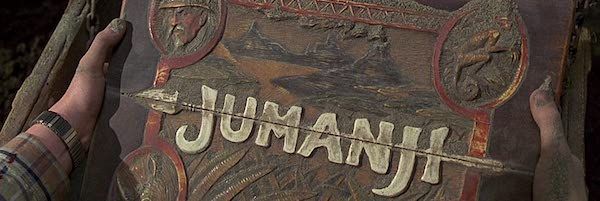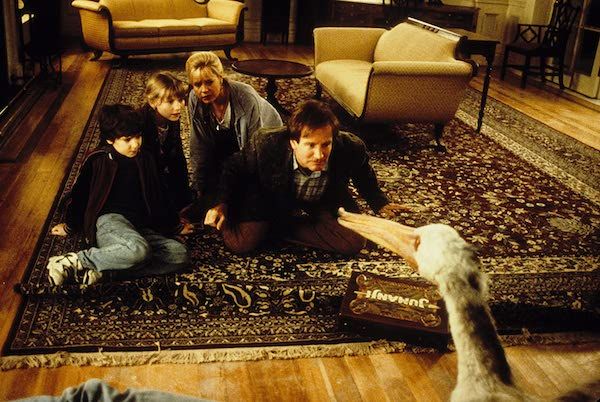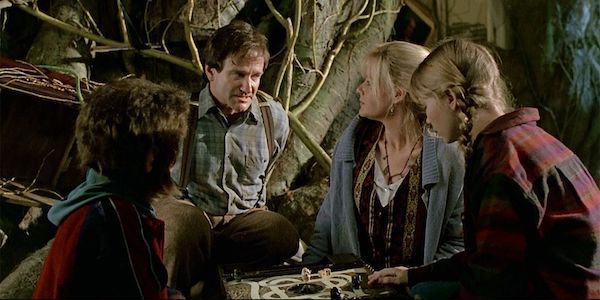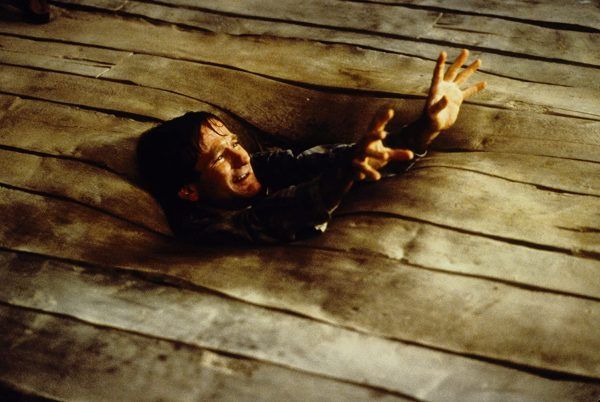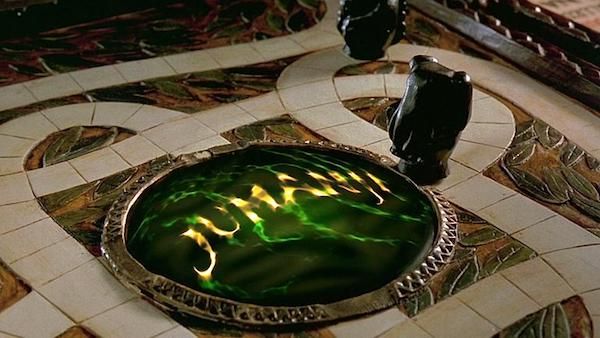I can't quite remember the first time I saw Jumanji, but I knew I was going to love it forever after I saw it on VHS a year or two after its December 1995 release. For me, Jumanji is the ultimate comfort movie. It's a movie which never fails to thrill, no matter how outdated the special effects or pop culture references get. Jumanji has impacted my understanding of movies in the broader sense, helping me to understand that they can be escapist, pleasurable, meaningful, and if you're lucky, all three at once. Even though time has hurried onward, with 25 years passing in the blink of an eye and two flashy sequels expanding the world of Jumanji even more, nothing can be the original.
"Jumanji: A game for those who see to find a way to leave their world behind."
Based on the 1981 Chris Van Allsburg children's book of the same name and directed by Joe Johnston, Jumanji tells the story of four people — adults Alan Parrish (Robin Williams) and Sarah Whittle (Bonnie Hunt) and young siblings Judy (Kirsten Dunst) and Peter Shepherd (Bradley Pierce) — who must finish a game begun 26 years earlier which sees different animals, plants, bugs, weather patterns, and one particularly nasty poacher emerge from the game to wreak havoc on their small New England town. Jumanji made over $100 million domestic during its time in theaters and is part of the respective epic, early runs for both Williams and Dunst, two of the '90s biggest stars.
When I first pitched the idea of writing about Jumanji, it didn't occur to me just how eerily appropriate a choice it would be to talk about at this moment in time. I was excited to talk about Jumanji because it's a movie that made me fall in love with Williams as an on-screen tour de force, with Dunst as a fearless and skilled actor, and with movies as an escapist outlet. But now, in our bleak mid-quarantine(ish), re-visiting Jumanji has illuminated just how inviting the idea of bringing the wild world crashing into one's own home sounds right now — even if that means having a stampede run through your living room.
Jumanji is, to me, the epitome of a comfort movie. For my money, with the exception of the special effects, everything holds up. The performances are still killer (this might be a top five Williams performance for me, and no, I am not kidding), Johnston's direction is still firing on all cylinders, James Horner's score is the perfect extra character who works overtime to electrify every scene with excitement, and the script written by Jonathan Hensleigh (Armageddon), Greg Taylor (Prancer), and Jim Strain is still airtight but with enough room for it to appeal to viewers of all ages. But the ultimate marker of Jumanji's greatness as a comfort movie, in my opinion, is that it never fails to thrill regardless of how many times I've watched it. Need proof? Well, let's going inside the movie and experience arguably the best scene in Jumanji's 104-minute runtime together.
"Don't be fooled, it isn't thunder. Staying put would be a blunder."
It starts with a fight about Billy Jessup. Billy, the boy who used bully Alan when they were kids back in 1969. After 26 years, Alan, now an adult, is still a bit ticked about the way Billy treated him and the only way to exorcise those feelings is to get into a childish fight with Sarah, Billy's childhood girlfriend and Alan's childhood friend. But as Alan and Sarah fight about the lasting impact of Billy's torment on Alan's psyche, he interrupts himself and asks the room, "Do you feel that?"
Unfortunately, Alan, Sarah, Judy, and Peter, a stampede is about to happen. Judy has just taken her turn while the adults bicker, quietly reading, "Don't be fooled, it isn't thunder. Staying put would be a blunder." As the string section of James Horner's immaculate score quickens, Alan moves to the bookcase and watches a small figurine jostle off a shelf and break. Books clatter to the ground and the steady beat of hooves rumble closer. Seconds before disaster strikes, Alan whips around and yells: "Run. It's a stampede!"
The Jumanji stampede sequence is one of two high-stakes stampedes '90s kids like myself had to try and process as young movie goers (can't forget The Lion King...). But the tension of that moment, watching it steadily build as it moves from a standard bit of bickering between Alan and Sarah before ratcheting up as Alan once again puts his hard-earned know-how from years spent living in the jungles of Jumanji to good use, was and still is fantastic. It also highlights just how good all of the action throughout Jumanji is to this day, with the consequences of every roll of the dice turning into one slow build into an explosion of action after another, each creature or natural disaster the game spits forth — be it monkeys or mosquitoes or a hungry lion or a house-ripping earthquake — cleverly revealed to astonishing and rewarding effect every time you watch.
"In the jungle you must wait, until the dice read five or eight."
Jumanji isn't Jumanji without Williams. 1995 was a more relaxed year for Williams in terms of output, with a supporting role in Nine Months, a small uncredited role in To Wong Foo Thanks for Everything, Julie Newmar, and his lead turn in Jumanji making up the bulk of his output. While Nine Months and To Wong Foo are solid flicks, we don't necessarily remember them for Williams. Jumanji is the real winner here and, as I've mentioned, it's really an all-timer of a performance. Williams gets to showcase his range in Jumanji, moving from his mile-a-minute quippy sensibilities to exercising his skills as an Errol Flynn-esque adventuring lead man, swinging from vines and fighting crocs during a monsoon, to bringing some depth to Alan's fraught relationship with his father (Jonathan Hyde), the scars of which he carries into adulthood. Williams, already a deeply important person in the lives on many people in my generation because of his body of work in the '80s and '90s, elevates Jumanji out of being a mere kid's movie and into the stuff of greatness.
"Adventurers beware: Do not begin unless you intend to finish."
At the end of the day, Jumanji is my ultimate comfort movie because it never fails to remind me adventure is still possible. No matter how old I get or whatever bullshit life throws at me, Jumanji guarantees a comforting optimism in under two hours. The very nature of its premise guarantees I'll be transported, heartened, and changed. Jumanji reminds me it's okay to hold firm to the vast and all-encompassing sense of wonder about the world I used to have as a kid. Life feels a little more manageable when you're trying to channel adventuring Alan Parrish; if he can survive 26 years in the jungle, I can survive this. And while there are some things life puts in our path we simply cannot reduce down so it better connects to a 1995 kid's movie, at least there is the promise of being able to pause life for a short while and dive headlong into Jumanji to leave the worries of your world behind.
For more My Comfort Movie essays from the Collider staff, check out Vinnie Mancuso on The Princess Bride and Tom Reimann on Hot Rod.

